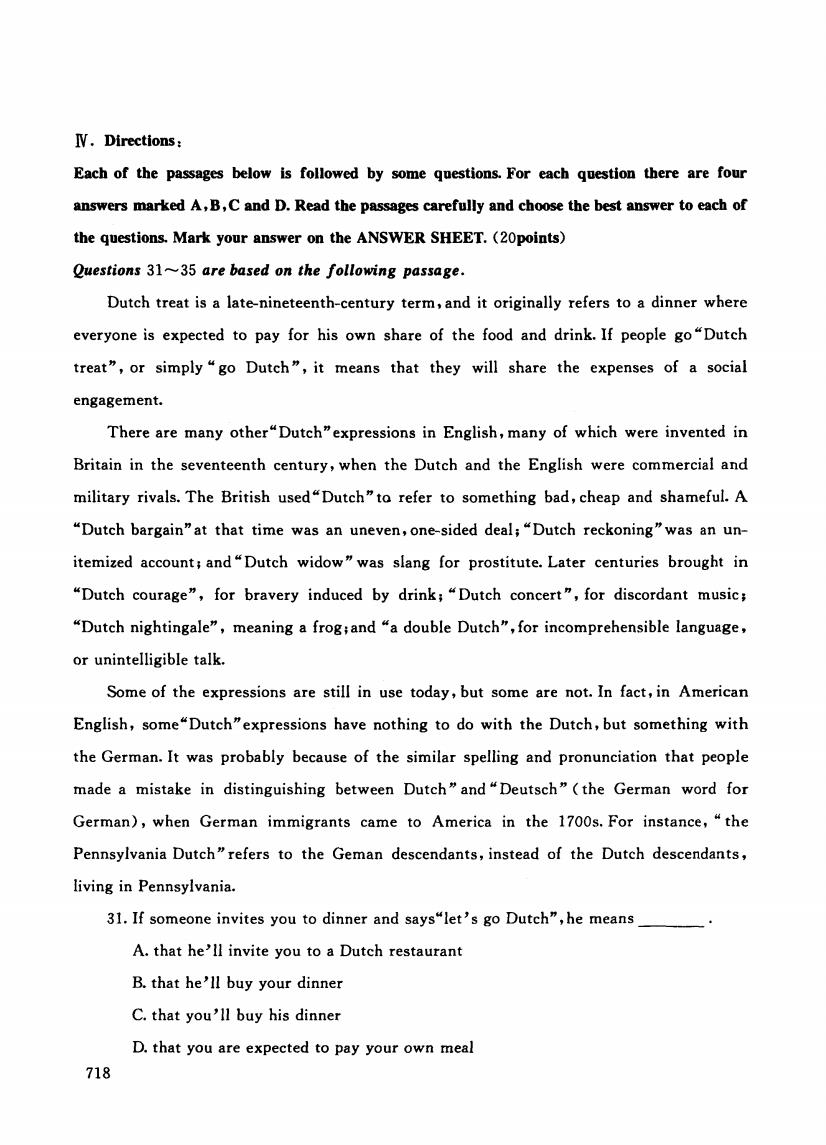正在加载图片...

I.Directions: Each of the passages below is followed by some questions.For each question there are four answers marked A,B,C and D.Read the passages carefully and choose the best answer to each of the questions.Mark your answer on the ANSWER SHEET.(20points) Questions 31~35 are based on the following passage. Dutch treat is a late-nineteenth-century term,and it originally refers to a dinner where everyone is expected to pay for his own share of the food and drink.If people go"Dutch treat",or simply "go Dutch",it means that they will share the expenses of a social engagement. There are many other"Dutch"expressions in English,many of which were invented in Britain in the seventeenth century,when the Dutch and the English were commercial and military rivals.The British used"Dutch"to refer to something bad,cheap and shameful.A “Dutch bargain”at that time was an uneven,one-sided deal;“Dutch reckoning”was an un- itemized account;and "Dutch widow"was slang for prostitute.Later centuries brought in "Dutch courage",for bravery induced by drink;"Dutch concert",for discordant music; "Dutch nightingale",meaning a frog;and "a double Dutch",for incomprehensible language, or unintelligible talk. Some of the expressions are still in use today,but some are not.In fact,in American English,some"Dutch"expressions have nothing to do with the Dutch,but something with the German.It was probably because of the similar spelling and pronunciation that people made a mistake in distinguishing between Dutch"and"Deutsch"(the German word for German),when German immigrants came to America in the 1700s.For instance,"the Pennsylvania Dutch"refers to the Geman descendants,instead of the Dutch descendants, living in Pennsylvania. 31.If someone invites you to dinner and says"let's go Dutch",he means A.that he'll invite you to a Dutch restaurant B.that he'll buy your dinner C.that you'll buy his dinner D.that you are expected to pay your own meal 718N. Directions : Each of the passag臼below is followed by some qu四tions. For 四ch qu臼tion there are fo answers marked A,B,C and D. 回d the passag臼carefully and chω民the 四t answer to each of the qu臼tions. Mark your answer on the ANSWER SHEET. (20points) Questions 31-35 are based on the following passage. Dutch treat is a late-nineteenth-century term, and it originally refers to a dinner where everyone is expected to pay for his own share of the food and drink. If people go "Dutch treat" , or simply" go Dutch" , it means that they will share the expenses of a social engagement. There are many other"Dutch飞xpressions in English , many of which were invented in Britain in the seventeenth century , when the Dutch and the English were commercial and military rivals. The British used"Dutch" to refer to something bad , cheap and shameful. A "Dutch bargain" at that time was an uneven , one-sided deal; "Dutch reckoning"was an unitemized account; and "Dutch widow" was slang for prostitute. Later centuries brought in "Dutch courage" , for bravery induced by drink; "Dutch concert" , for discordant music; "Dutch nightingale" , meaning a frog; and "a double Dutch" ,for incomprehensible language , or unintelligible talk. Some of the expressions are still in use today , but some are not. In fact , in American English , some"Dutch"expressions have nothing to do with the Dutch , but something with the German. It was probably because of the similar spelling and pronunciation that people made a mistake in distinguishing between Dutch" and" Deutsch" (the German word for German) , when German immigrants came to America in the 1700s. For instance , "the Pennsylvania Dutch" refers to the Geman descendants, instead of the Dutch descendants , living in Pennsylvania. 31. If someone invites you to dinner and says"let's go Dutch" ,he means A. that he'll invite you to a Dutch restaurant B. that he'll buy your dinner c. that you' 11 buy his dinner D. that you are expected to pay your own meal 718